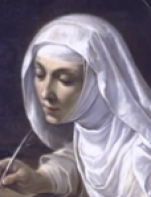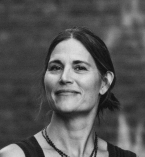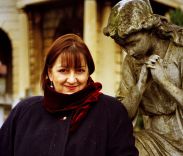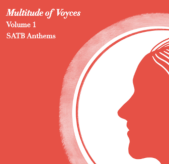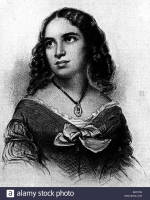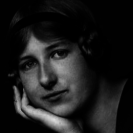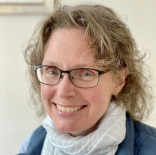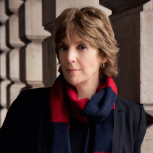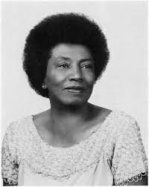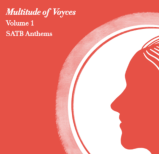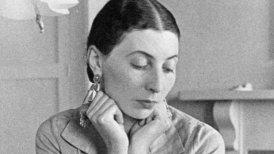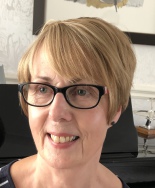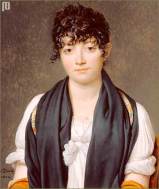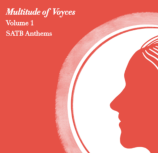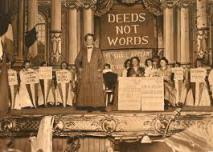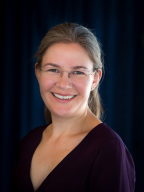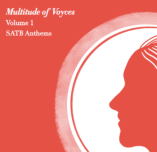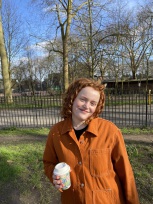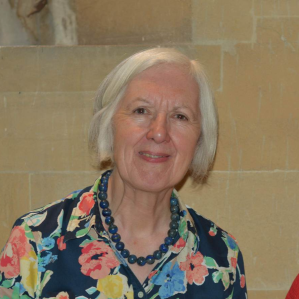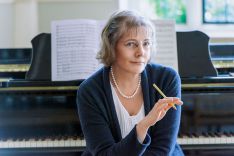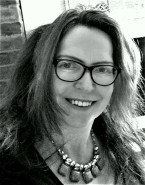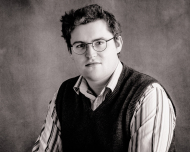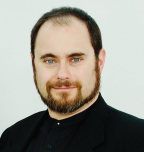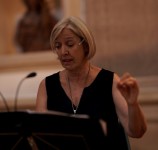Volume 1 - composers and editors
These brief biographies are taken from Multitude of Voyces Anthology series Sacred Music by Women Composers. Unless otherwise indicated the texts are copyright of Multitude of Voyces C.I.C. and may be utilised for educational and research purposes such as inclusion within concert programmes when music from our volumes is performed (please include appropriate acknowledgements). Please do not copy biographies which are marked with an * as these are the legal property of third parties. Photographs are copyright of the photographers where indicated and may not be reproduced in any form without the composers' and photographers' permission. We invite schools and other places of learning to make a small donation to our funds when using these resources.
Raffaela Aleotti (c.1570-c.1646)
Raffaela Aleotti was an Italian organist, prioress and composer. She was born in Argenta, Ferrara, and lived for much of her life in the Augustinian Convent of San Vito, which was famed for its music. She began to play the organ in 1593 and went on to become Director of Vocal and Instrumental Ensembles and ultimately Prioress. Contemporary accounts of musical performances in the convent under her supervision are full of praise and adulation. Under her direction the nuns of San Vito performed for Pope Clement VIII and Margaret of Austria. Her madrigals and motets were widely celebrated, although most are now lost.
Rani Arbo (b.1968)
Rani Arbo is a singer, songwriter, fiddler and guitarist best known for her work with the Americana bands Salamander Crossing (1991-2000) and Rani Arbo & daisy mayhem (2000-present), which collectively released ten albums on the Signature Sounds label. Crossing the Bar appears on two of those: Bottleneck Dreams (Salamander Crossing) and Some Bright Morning (Rani Arbo & daisy mayhem), in different versions. Both quartets toured North America extensively, performing at university and community arts centres, coffee houses, and folk and world music festivals. Arbo is also founder and director of the Middletown, Connecticut, Community Chorus and a regular teacher of harmony singing and choral workshops.
Judith Bingham (b.1952)
Born in Nottingham and brought up in Mansfield and Sheffield, Judith Bingham began composing as a small child, and then studied composing and singing at the Royal Academy of Music in London. She was for many years in the BBC Singers before becoming their Composer in Residence. Her career has been marked by many outstanding works for the Church. In later years she has become known for her organ music, but she has also written large-scale works for orchestra, a church opera, The Ivory Tree, and a substantial canon of chamber music. Composition prizes include: the Barlow Prize for a cappella music in 2004 and four British Composer Awards in the choral, instrumental and liturgical categories. The University of Aberdeen awarded her an Honorary Doctorate in 2017.
Sulpitia Cesis (1577-c.1619)
Sulpitia Lodovica Cesis was an Italian composer born in Modena, Italy. The daughter of Count Annibale Cesis, she chose to enter the Augustinian convent of San Geminiano, renowned for its music, in Modena in 1593. Her only known work is the collection of 23 motets for two to twelve voices, Motetti Spirituali, which was published in 1619. The work is important both for the generally high quality of the works it contains and for the information it provides regarding performance practice in Italian convents in the early seventeenth century. Cesis dedicated the collection to a nun of the same name, Reverend Mother Anna Maria Cesis of the Convent of Santa Lucia in Rome, another priory that was also well known for its music. The motets are believed to have been performed at the doors of San Geminiano in 1596.
(Unverified portrait)
Fanny Hensel (1805-1847)
German pianist and composer Fanny Hensel was the eldest sister and confidante of Felix Mendelssohn. Born in Hamburg, she was taught to play the piano by her mother, who in turn had been taught by a student of J.S. Bach. A prodigious talent, she is said to have memorized J.S. Bach’s Well-Tempered Clavier by the age of 13. In 1820 she and her brother were enrolled in the Sing-Akademie in Berlin, directed by the composer Carl Friedrich Zelter. Zelter was so impressed by her that he wrote a letter to Goethe claiming that, ‘This child really is something special.’
Her father, however, was less enamoured with his daughter’s talent. In a letter in 1820, he warned her that, ‘Music will perhaps become his [Felix’s] profession, while for you it can and must be only an ornament.’ Whilst her younger brother received public acclaim, Fanny Mendelssohn remained in the shadows. Married in 1829, Hensel only made her performance debut in 1838, at the age of 33, when she performed Felix’s Piano Concerto No.1.
Hensel was also a prolific composer: she composed approximately 500 works, including pieces for piano, lieder, chamber music, cantatas and oratorios. However, most of her surviving works exist only in manuscript. The few works of hers that are in print were published under her brother’s name: six of her songs form part of Felix Mendelssohn’s Twelve Songs. A notable example is her song Italien, which caused some embarrassment in Buckingham Palace when Queen Victoria told Felix Mendelssohn that she would sing her favourite of his songs and began to sing Italien. It was not until 1846 that Hensel, aged 40, published her first work in her own name.
In 2010 experts discovered that Easter Sonata (1828), which had been attributed to Felix since the 1970s, was actually by Fanny Mendelssohn. It had its first performance under her name on International Women’s Day, 8th March, 2017.
Imogen Holst (1907-1984)
Imogen Holst was born in Richmond, Surrey, and studied at St Paul’s Girls’ School and the Royal College of Music. She won several prizes during her study, including the Cobbett prize for a Phantasy string quartet and a travelling scholarship upon leaving the College in 1930. In 1931, she embarked upon a career as a freelance musician; composing, editing and writing, particularly about her father Gustav. Her biography of her father was published in 1938. She was an inspirational teacher and between 1940 and 1942 she worked in the southwest of England encouraging music-making amongst civilians in rural areas. Then in 1943, she started a music training course at Dartington Hall in Devon, which eventually became Dartington College. She returned to freelance music in 1951, soon to be asked by Benjamin Britten to work with him at the Aldeburgh Festival, where she served as his musical assistant and eventually Artistic Director from 1956 to 1977. She felt particularly responsible for her father’s music, and supervised and conducted recordings, revised editions and compiled a thematic catalogue. She died in Aldeburgh in March 1984 and is buried in the parish churchyard.
Sarah MacDonald (b.1968)
Sarah MacDonald is a Canadian-born organist, conductor and composer, currently living in the UK, where she is a Fellow and Director of Music at Selwyn College, Cambridge, and Director of Ely Cathedral Girls' Choir. She has been at Selwyn since 1999, and is the first woman to hold such a post in an Oxbridge chapel. MacDonald studied at Toronton's Glenn Gould School and at Cambridge University, and her teachers were Leon Fleisher, Marek Jablonski, John Tuttle, and David Sanger. She has performed across the UK, North America, the Middle East, and mainland Europe, and is in demand as a conductor and teacher for international residential courses. She has made over 35 commercial recordings and had numerous choral works published. She holds the Fellowship diploma of the Royal College of Organists, and writes a popular monthly column for the American Guild of Organists' magazine, The American Organist. In 2018 MacDonald recieved the honorary ARSCM (Associate of the Royal School of Church Music) in recognition of her contribution to choral music.
Cecilia McDowall (b.1951)
Cecilia McDowall has been described by the International Record Review as having 'a communicative gift that is very rare in modern music'. Often inspired by extra0musical influences, her writing combines a rhythmic vitality with expressive lyricism 'which is, at times, intensely moving'. She has won many awards and has been short-listed seven times for the British Composers Awards. IN 2014 she won the British Composer Award for choral music. Her msuic has been commissioned and performed by leading choirs, including the BBC Singers, ensembles and at major festivals both in Britain and abroad and has been broadcast on BBC Radio and worldwide.
McDowall is regarded affectionately by counteless amateur ensembles that have commissioned her music. Her pieces convey her understanding of choirs' individuality, bringing out their capabilities and responding to their traditions. She takes pains to attend and support as many performances as she can.
High-profile commissions just since 2016 have included work for King's College, Cambridge, and Roderick Williams. The whole list is much longer. Oxford University Press has signed McDowall as an 'Oxford' composer and she is currently Composer-in-residence at Dulwich College, London. In 2013 she received an Honorary Doctorate in Music from the University of Portsmouth and in 2017 McDowall was selected for an Honorary Fellow award by the Royal School of Church Music.
Undine Smith Moore (1904-1989)
Undine Smith Moore was born in Virginia, USA. Her father was a railroad brakeman and her grandparents were slaves. Her early musical education combined a rigorous grounding in music theory (Moore began to compose at the age of nine) with the pervasive influence of African American work songs and spirituals.
Moore won from the Juilliard Graduate School a scholarship to study at Fisk University, a predominantly African American institution in Tennessee whose chorus was fêted for its performances of spirituals. At the end of her first year, Moore’s father gave her a Steinway grand piano, and for a while she considered becoming a concert pianist. She graduated in 1926 at the top of her class with joint honours in piano and composition. In 1927 she became a faculty member at Virginia State College, lecturing there for 45 years and establishing a Black Music Centre, of which she was co-director. Moore attended Colombia University Teachers’ College from 1931, where she completed an M.A. in music education. She furthered her studies at the Eastman School of Music and the Manhattan School of Music.
Retirement only increased Moore’s productivity, and she composed prolifically until just before her death. Her choral cantata, Scenes from the Life of a Martyr, depicting scenes from the life of Dr. Martin Luther King Jr., was nominated for a Pulitzer Prize after its première in 1982. In 1971, Moore visited Africa and was deeply moved by her experiences there. One of her last compositions was a trio for violin, cello and piano called Soweto, which is based upon Moore’s responses to apartheid.
She was awarded honorary doctorates from Virginia State College and Indiana University in 1972, and in 1975 the mayor of Petersburg proclaimed 13th April as Undine Moore Day.
Maria Xaveria Peruchona (c.1652- after 1709)
Maria Xaveria Peruchona (or Parruchona) was born in the northern Italian town of Gozzano. At the age of sixteen she entered the Ursuline convent in Galliate, where she apparently studied music with Francesco Beria and Antonio Grosso. She suffered from poor health throughout her life, and died in the convent sometime after 1709. Her only known musical output was Sacri concerti de motetti a una, due, tre, e quattro voci, parte con violini, e parte senza, published in 1675 by Francesco Vigone of Milan. Of the eighteen pieces in this collection, the works for smaller ensembles are particularly fine. Her texts, while lacking the polished eloquence of her fellow Ursuline, Isabella Leonarda, are intensely personal and deeply felt.
Elizabeth Poston (1905-87)
Elizabeth Poston, well known for her unique carol, Jesus Christ the Apple Tree, was a prolific composer, particularly of songs, producing a dozen or so meticulously researched song-books, as well as orchestral and chamber music, choral works and two operettas (altogether at least 920 works).
Born in rural Hertfordshire, she was inspired by the sounds of the countryside, saying that songs were ‘always her first and permanent love’. Her adored home, Rooks Nest House, standing on the northern outskirts of Stevenage, in view of the Chilterns, was equally appreciated by E. M. Forster, who had spent much of his youth there. He subsequently based his novel, Howards End on the house and its Poston inhabitants. Elizabeth had the moving experience of writing the incidental music for its 1970 BBC film production, as she also did for that of his Room with a View and some 65 other BBC commissions.
She had a long association with the BBC: even as a student her Compositions were broadcast; in her early 30s during World War II, she was appointed Director of Music for the European Service, transmitting coded messages in the form of precisely-timed recorded music; after the war she helped to set up the BBC Third Programme, served on the BBC Advisory Panel and broadcast as a pianist and gave talks, including two notable series on her close friend, the composer Peter Warlock, who loved fifteenth and sixteenth century texts as she did – ‘the music of the words’. (Dr John S. Alabaster author: Elizabeth Poston: Catalogue of Works with Biographical Context (Alabaster, J. S., 2018))
She had a long association with the BBC: even as a student her Compositions were broadcast; in her early 30s during World War II, she was appointed Director of Music for the European Service, transmitting coded messages in the form of precisely-timed recorded music; after the war she helped to set up the BBC Third Programme, served on the BBC Advisory Panel and broadcast as a pianist and gave talks, including two notable series on her close friend, the composer Peter Warlock, who loved fifteenth and sixteenth century texts as she did – ‘the music of the words’. (Dr John S. Alabaster author: Elizabeth Poston: Catalogue of Works with Biographical Context (Alabaster, J. S., 2018))
Gail Randall (b.1955)
Born in Coventry, Gail Randall studied flute, piano and singing at Trinity College of Music, London, and is a self-taught composer. After a career in education as well as performing as a flautist, retirement provided more time to further interests of composing, performing, church work and campanology. Randall is an Authorised Lay Minister in the Diocese of Manchester, based at St Thomas Church, Moorside, Oldham, where she also directs the choir as well as a handbell group, which has a busy schedule performing in the local community. A competent campanololgist, Randall has rung more than two thousand peals in the UK, USA and Europe. Her works have been performed by choirs and instrumental groups in the North West of England. The Call was performed on BBC Radio 4 by the choir of Glasgow Cathedral, directed by Frikki Walker, as part of the Morning Service on 8th March 2020.
Louise Reichardt (1779-1826)
Caroline Louise Reichardt was a composer, music teacher and choir director. Born in Berlin, Reichardt was the daughter of two composers. Her mother, Juliane Benda, continued to compose and perform after the birth of her children; whilst the work of her father, Johann Friedrich Reichardt, was very well regarded at the time. Despite her origins, Reichardt received little musical education from her parents: her mother died when she was four years old and her father was too preoccupied with his own music to make adequate time to educate his daughter.
Although Reichardt lacked any formal education, she had the privilege of living in a home that was constantly filled with the leading writers of the day: Goethe, Eichendorff, Clemens and Bettina Brentano, the Brothers Grimm, and von Arnim all frequented the Reichardt household. Goethe called her home ‘die Herberge der Romantik’ (the sheltering place of Romanticism) and Eichendorff was inspired by his time there to write the poem, ‘Da steht eine Burg überm Tale’. Reichardt was clearly inspired by this intellectually stimulating environment as her songs often set texts by these talented contemporary writers.
In 1809 Reichardt moved to Hamburg where she earned a living as a singing teacher and studied composition with Johann Frederich Clasing. She ran a Gesangverein women’s chorus, for which she composed and arranged music, and provided German translations of any Latin texts. During her time in Hamburg, Reinhardt became particularly fascinated by the works of G.F. Handel and founded the Hamburg Choral Society to promote his music and that of J.S. Bach. However, despite the importance of her influence on musical life in the city, Reichardt was only allowed to conduct her choirs in rehearsals as it was deemed inappropriate for a woman to conduct in public.
Most of Reichardt’s music was composed during her time in Hamburg. She wrote more than 75 songs and choral works, both sacred and secular, many of which appear in popular lieder anthologies. Her hymn tunes were also well known during her lifetime, appearing in no less than 21 different late nineteenth-century hymnals.
Anna Semple (b.1997)
Anna Semple read music at Trinity Hall, Cambridge, graduating in 2018. Since then her works have been premièred by the Chapel Choir of Jesus College, Cambridge, the Malcolm Street Orchestra, the Choirs of Churchill and Murray Edwards colleges, Cambridge, and Horizon Voices. Commissions include works for the Choir of St John's College, Cambridge, and Mad Song at the Aberystwyth Festival 2019. Her first opera, The Next Station is Green Park, was premièred at the Royal Scottish Conservatoire in June 2019. She is studying from 2019 at the Guildhall School of Music and Drama for her MMus in Composition, and also maintains a career as a freelance singer.
Ethel Smyth (1858-1944)
Ethel Mary Smyth was born in Marylebone, London and brought up at the family house, Frimhurst, at Frimley in Surrey. Despite her father’s vehement opposition to her pursuing a career as a composer, in 1877 Smyth was allowed to further her musical education at the Leipzig Conservatoire. During her time in Leipzig, Smyth met Antonin Dvořák, Edvard Grieg and most notably Pyotr Tchaikovsky, who encouraged her to study orchestration. She left the conservatoire after a year to study privately with Heinrich von Herzogenberg who introduced her to Clara Schumann and Johannes Brahms.
When Smyth returned to England, her orchestral and choral music were very favourably received. In 1890, her Serenade in D was premièred in Crystal Palace and in 1893 her Mass in D was performed at the Royal Albert Hall by the Royal Choral Society. Smyth is best known for her operas, of which there are six. The Wreckers and The Boatswain’s Mate met with particular acclaim at their debuts, whilst in 1903 Der Wald was the first opera written by a woman to be performed at New York's Metropolitan Opera.
An ardent supporter of women’s rights, Smyth was devoted to the cause of female suffrage. Laggard Dawn and The March of the Women were premièred by a chorus of Suffragettes at a fundraising rally at the Royal Albert Hall in 1911. In 1921, she was sentenced to two months’ imprisonment in Holloway prison alongside Emmeline Pankhurst for smashing the windows of suffrage opponents’ homes across London. It was during her time in Holloway that the most famous performance of The March of the Women took place: while the prisoners were taking their outdoor exercise in the prison yard, Smyth conducted their singing with her toothbrush from a nearby window. She conducted The March of Women once more in 1930, this time at an unveiling of a statue of Emmeline Pankhurst in the Victoria Tower Gardens. Ethel Smyth was made a Dame Commander of the Order of the British Empire in 1922 for her services to music.
Olivia Sparkhall (b.1976)
Olivia Sparkhall is Head of Academic Music at Godolphin School in Salisbury, Wiltshire, where she directs the multi-award-winning Godolphin Vocal Ensemble. She is a composer and arranger primarily of choral music, notably for her choir to sing in BBC One’s Songs of Praise Choir of the Year Competitions. Her association with Multitude of Voyces has resulted in several commissions: for International Women’s Day services in 2018 (Lux) and 2019 (Faith and Hope). She has also been commissioned to write Makaton Mass, the first mass conceived to be integrally sung and signed. She conducts massed-children’s choir concerts for the charity Barnardo’s.
Greta Tomlins (1912-72)
Greta Tomlins was an English composer best known for her sacred choral music and carols. Tomlins was educated at Roedean School and read Music at Lady Margaret Hall, Oxford. She continued her studies in composition at the Royal College of Music. Although Tomlins largely wrote vocal music, her Alpine Suite for percussion, piano and strings was also very well received. Tomlins was a fervent champion of women's education: in 1941 she was appointed as a lecturer in music at Homerton College, Cambridge (then a female-only establishment). She was greatly admired by her students, namely for introducing choral singing into the heart of the college's musical life. Weekly choir attendance was compulsory. During these rehearsals on a Friday evening, Tomlins introduced the students to a wide range of music from Hebridean love songs to Handel's Messiah. Note: unfortunately we have not been able to verify a photograph of Greta Tomlins and will be very grateful for information).
Joanna Ward (b.1998)
Joanna Ward is a composer and performer from Newcastle upon Tyne. She is a choral singer, soloist and one half of the duo The Mermaid Café for whom she has written and commissioned new work. Her focus is on contemporary music written by women. While still an undergraduate at Jesus College, Cambridge, she composed music for Sound and Music, NMC Recordings, ensemble recherche, the Royal Northern Sinfonia, the Choir of St John’s College, Cambridge, and more. She became one of the inaugural Young Composers with the National Youth Choirs of Great Britain in 2018. Jesus College commissioned She is More Precious than Rubies to celebrate 40 years since admitting women in 1979. After graduation in 2019 she was accepted for a Master’s degree in Composition at Guildhall School of Music and Drama with a Scholarship and supported by a Vaughan Williams Bursary.
Judith Weir (b.1954)
Judith Weir, born to Scottish parents in Cambridge, studied composition with John Tavener, Robin Holloway and Gunther Schuller. On leaving Cambridge University in 1976 she taught in England and Scotland, and in the mid-1990s became Associate Composer with the City of Birmingham Symphony Orchestra and Artistic Director of Spitalfields Festival. She was a Visiting Professor at Princeton (2001) Harvard (2004) and Cardiff (2006-13) and in 2014 was appointed Master of the Queen's Music. In 2015 she became Associate Composer to the BBC Singers. (This paragraph copyright Peters Ed).
She is the composer of several operas (written for Kent Opera, Scottish Opera, English National Opera and Bregenz) which have been widely performed. She has written orchestral music for the BBC Symphony, Boston Symphony and Minnesota Orchestras. Much of her music has been recorded and is available on the NMC, Delphian and Signum labels. (This paragraph copyright Music Sales) (Photograph, Judith Weir and Louise Stewart in conversation during the research phase of our Sacred Music by Women Composers series).
Janet Wheeler (b.1957)
Janet Wheeler was a junior exhibitioner at the Guildhall School of Music and Drama before reading music at Cambridge, where she studied composition with Robin Holloway and Hugh Wood. Throughout her career she has worn various musical hats; teacher, music producer for BBC School Radio, and Musical Director of choirs large and small – from Saffron Walden Choral Society to massed school choirs and small vocal ensembles. Although always a composer at heart, continually writing and arranging music as part of all these endeavours, it is especially over the last ten years that her works have begun to reach a wider audience. Her music has been performed at Wigmore Hall by I Fagiolini, at Saffron Hall, in cathedrals and college chapels across the UK and abroad, at the Three Choirs Festival, and broadcast on BBC Radio 3.
Recent commissions have included pieces for ORA Singers, the National Youth Choir of Great Britain, Sonoro, Papagena, and the test piece for the London International Choral Conducting Competition. Her larger pieces include several multimovement works for choir and orchestra, such as The Ceaseless Round of Circling Planets, a commission for the Thaxted Festival.
Above all, Wheeler prioritises writing music that is rewarding to sing, and that enhances and elucidates the words she chooses to set. She cherishes collaborations with writers such as Kevin Crossley-Holland and Nick Warburton and she finds rich compositional inspiration in the interplay between words and music.
Text copyright: MazeMusic
Helen Williams (b.1969)
Helen Williams combines being an ecclesiastical composer and embroiderer with regular employment as an NHS Music Therapist. Improvisation plays a large part in her work both with adults and children with intellectual disabilities and as a pianist-accompanist for Cecchetti ballet schools. She studied composition at Junior Guildhall School of Music and Drama with Michael Omer. Becoming one of the first female Choral Scholars at St Peter's College, Oxford, she began composing for choir. She also plays the viola and tenor viol. Living in Epsom, she has written mainly for St Martin's Church, where her congregational psalm responses are used most weeks, and for Epsom Chamber Choir. "I enjoy creating and restoring anything, whether lasting or ephemeral, that makes emotional and spiritual connections."
Alison Willis (b.1971)
Alison Willis is an award-winning composer whose works have been performed and broadcast internationally. Her music has been described as, "Intensely moving", "Beautiful yet pragmatic" and "Saying what you have to say and then stopping".
She finds particular inspiration in historical sources and events and social issues and enjoys working collaboratively with both young people and adults. Willis is also an experienced pianist, organist, folk musician and Musical Director, enjoys composing music for theatre and is a Trustee of the Martin Read Foundation, supporting young composers.
Maks Adach, editor, Ethel Smyth: Komm susser Tod
Maks Adach read music as Organ Scholar of Oriel College, Oxford. Whilst he undertook postgraduate research at Oxford, he served as Director of Music at both St John's College and Pusey House. Following his time as Organ Scholar of both Lichfield and Liverpool Cathedrals, he moved to the USA where he works as Assistant Director of Music at St Paul's Roman Catholic Church and Choir School, Harvard Square - one of only a handful of American institutions to offer daily choral worshi
Henry Lebedinsky, editor, Maria Xaveria Peruchona: Cessate tympana, cessate praelia
American historical keyboardist, composer and conductor Henry Lebedinsky has performed with the Seattle Baroque Orchestra, Seattle Symphony, Seattle Opera, the St . Paul Chamber Orchestra, the Charlotte Symphony, Seraphic Fire, and Sonoma Bach, among others. He is the co-Artistic Director of Seattle's Pacific MusicWorks, and is the founder of PMW's Underground concert series, dedicated to bringing old music to new audiences in unconventional, fun, and exciting venues. With the San Francisco-based band Agave Baroque, he has released two albums with countertenor Reginald L. Mobley on the VGo Recordings label. He and Mr Mobley have spent the past decade introducing audiences to music by Black composers from the past 250 years. An active composer and poet, his sacred music is published by Paraclete Press, Carus-Verlag Stuttgart, and CanticaNOVA. He currently serves as Organist and Choirmaster at Seattle’s historic Christ Episcopal Church.
Candace Smith, editor Sulpitia Cesis: Stabat Mater
Candace Smith is an American editor and musicologist who has spent most of her life in Italy. She was particularly active in the field of contemporary music before going on to the Schola Cantorum Basiliensis (Switzerland), where she specialized in medieval music under Andrea von Ramm. In Italy she studied and collaborated with the late singer Cathy Berberian, among others. In 1994 she earned a diploma in vocal pedagogy from the Rabine-Institut für funktionale Stimmpädagogik in Germany. She is active as a teacher throughout Europe, working with singers of varying repertoires (both classical and not), as well as actors, music teachers, psychiatric patients and others. She teaches voice at the Bernstein School of Musical Theatre in Bologna and the Accademia Teatrale Veneta in Venice.
Smith has collaborated and recorded with numerous ensembles of early music. Her first experience with early music composed by women was with her ensemble, Concerto delle Dame (1978-89), one of the first to specialize in this repertoire. In 1991 she founded Cappella Artemisia, dedicated to performing the music of Italian convents of the 16th and 17th centuries (www.cappella-artemisia.com). The ensemble has currently nine recordings on the Tactus and Brilliant Classic labels.
In 1997 she began publishing the repertoire of her ensemble, together with her husband, American cornettist Bruce Dickey, under the name of Artemisia Editions.

